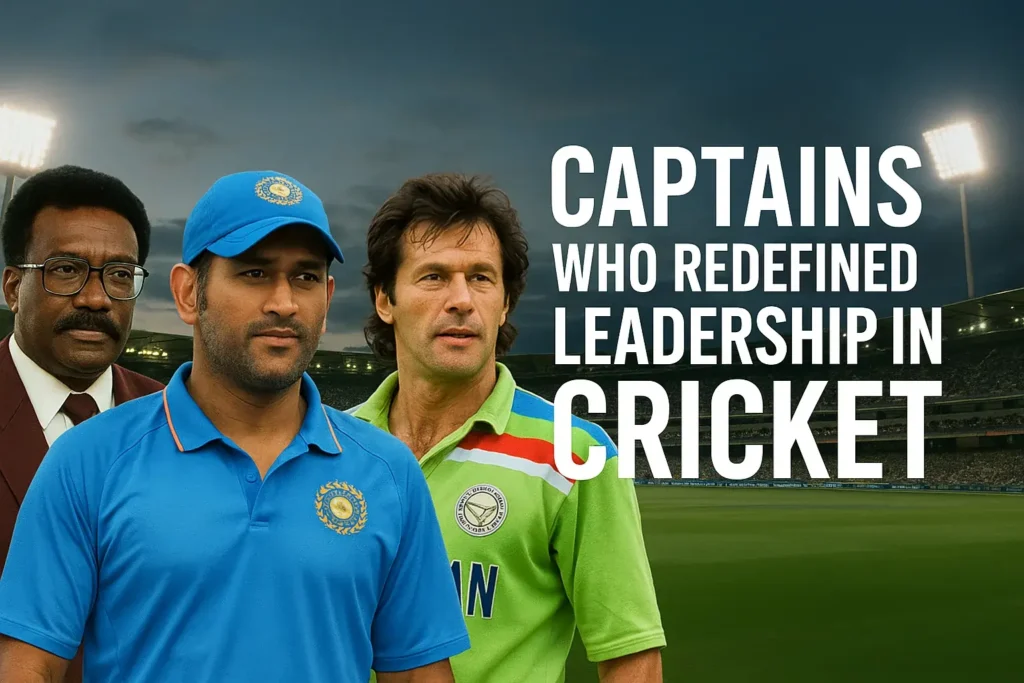Introduction
Cricket has always been more than just a contest between bat and ball. It is a game of strategies, team spirit, and decisive leadership. The captain, often called the “on-field general,” carries the responsibility of not just making tactical decisions but also inspiring the team to perform at their best. From setting fields and managing bowlers to motivating teammates during tough times, the role of a captain goes far beyond the toss.
Over the decades, several cricket captains have left their mark on the game by redefining leadership. They introduced new approaches, instilled belief in their teams, and turned struggling sides into world-beaters. These leaders weren’t just skilled players—they were visionaries who understood the psychology of the game and used it to achieve glory.
In this article, we celebrate the captains who redefined leadership in cricket, exploring their styles, achievements, and lasting impact on the sport.
The Pioneers of Leadership
1. Sir Frank Worrell (West Indies)
Frank Worrell became the first Black captain of the West Indies in the 1960s, and his appointment changed the dynamics of Caribbean cricket forever. He united a divided team representing different islands and gave them a collective identity.
- Leadership Style: Inspirational and unifying.
- Legacy: Known for his sportsmanship and ability to transform the West Indies into a respected cricketing force.
2. Richie Benaud (Australia)
Benaud wasn’t just a great leg-spinner but also one of the most progressive captains of his time. He promoted attacking cricket, encouraged risk-taking, and played a key role in making the sport more entertaining.
- Leadership Style: Positive, attacking, and innovative.
- Legacy: Laid the foundation for Australia’s future dominance with his aggressive mindset.
Captains Who Created Dynasties
3. Clive Lloyd (West Indies)
Lloyd took charge of the West Indies in the 1970s and built a team that dominated world cricket for nearly two decades. His use of a four-pronged pace attack became legendary and set new benchmarks for aggression.
- Leadership Style: Fearless and dominant.
- Legacy: Led West Indies to two consecutive World Cup titles (1975, 1979).
4. Steve Waugh (Australia)
Waugh turned Australia into an unbeatable side in the late 1990s and early 2000s. He emphasized mental toughness and often outplayed opponents even before the first ball was bowled.
- Leadership Style: Ruthless and uncompromising.
- Legacy: Captained Australia to a record 16 consecutive Test wins.
5. Ricky Ponting (Australia)
Ponting inherited a strong team from Steve Waugh and took it to even greater heights. Under his leadership, Australia played with unmatched aggression and professionalism.
- Leadership Style: Aggressive, disciplined, and results-driven.
- Legacy: Won two consecutive World Cups (2003, 2007) as captain.
Captains Who Transformed Teams
6. Sourav Ganguly (India)
When Ganguly became captain in 2000, Indian cricket was recovering from a match-fixing scandal. He rebuilt the team with young talent and instilled aggression and self-belief in the players.
- Leadership Style: Fearless and motivating.
- Legacy: Laid the foundation for India’s overseas success and nurtured stars like Sehwag, Yuvraj, and Dhoni.
7. MS Dhoni (India)
Dhoni’s calm demeanor and sharp decision-making made him one of the most successful captains in cricket history. His ability to stay composed in high-pressure situations earned him the nickname “Captain Cool.”
- Leadership Style: Calm, tactical, and instinctive.
- Legacy: Only captain to win all three ICC trophies (T20 World Cup 2007, ODI World Cup 2011, Champions Trophy 2013).
8. Brendon McCullum (New Zealand)
McCullum transformed New Zealand cricket with his fearless approach. He encouraged his team to play aggressive and entertaining cricket, regardless of the result.
- Leadership Style: Positive, fearless, and team-first.
- Legacy: Took New Zealand to their first-ever World Cup final in 2015.
Captains Who Inspired Against the Odds
9. Imran Khan (Pakistan)
Imran wasn’t just a world-class all-rounder but also a charismatic leader who inspired his team to achieve the impossible. His greatest triumph came in 1992 when he led Pakistan to their first World Cup victory.
- Leadership Style: Charismatic, bold, and inspiring.
- Legacy: Inspired Pakistan with his “cornered tigers” spirit.
10. Kane Williamson (New Zealand)
Williamson epitomizes grace and calm leadership. Despite being soft-spoken, he led New Zealand with dignity and tactical brilliance, guiding them to consistent success across formats.
- Leadership Style: Calm, humble, and tactical.
- Legacy: Captained New Zealand to victory in the inaugural World Test Championship (2021).
11. Graeme Smith (South Africa)
Smith became South Africa’s Test captain at just 22 years old. His fearless leadership helped the Proteas become the No. 1 Test team in the world.
- Leadership Style: Brave and determined.
- Legacy: Holds the record for most Test wins as a captain (53).
Leadership Styles That Changed Cricket
Each of these captains brought something unique to the game:
- Clive Lloyd & Steve Waugh: Built dynasties of dominance.
- Sourav Ganguly & Brendon McCullum: Transformed their teams’ mentality.
- MS Dhoni & Kane Williamson: Redefined calm and composure under pressure.
- Imran Khan: Inspired his team to dream big and fight against the odds.
Their leadership wasn’t just about tactics—it was about instilling belief, building culture, and leading by example.
Lessons from Great Cricket Captains
The greatest cricket captains teach us important lessons:
- Vision Matters – Leaders like Clive Lloyd and Ganguly saw the bigger picture and built future-ready teams.
- Adaptability – Dhoni showed how to adapt tactics to suit changing formats.
- Resilience – Graeme Smith and Imran Khan proved that true leaders rise in adversity.
- Team Unity – Frank Worrell demonstrated that bringing people together is as important as winning matches.
- Positive Mindset – McCullum’s fearless approach redefined how a team could play cricket with joy.
Cricket captains are more than just players—they are visionaries who shape the destiny of their teams. From the dominance of Clive Lloyd’s West Indies to the calm leadership of MS Dhoni and Kane Williamson, these captains redefined what leadership in cricket means.
Their impact goes beyond numbers and trophies; they created cultures of excellence, unity, and resilience. They proved that leadership is not about power, but about influence, inspiration, and the ability to bring out the best in others.
As cricket continues to evolve with new formats and challenges, the legacy of these legendary captains will remain a guiding light for future leaders of the game.
FAQs
Q1. Who is the most successful captain in terms of ICC trophies?
MS Dhoni, with three ICC trophies (2007 T20 WC, 2011 ODI WC, 2013 Champions Trophy).
Q2. Which captain led his team to the most consecutive Test wins?
Steve Waugh’s Australia achieved 16 consecutive Test wins.
Q3. Who was the youngest Test captain in cricket history?
Tatenda Taibu of Zimbabwe at age 20, though Graeme Smith of South Africa also became captain at just 22.
Q4. Who was the first Black captain of the West Indies?
Sir Frank Worrell.
Q5. Which New Zealand captain led them to their first World Test Championship title?
Kane Williamson in 2021.

